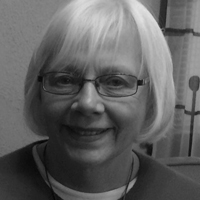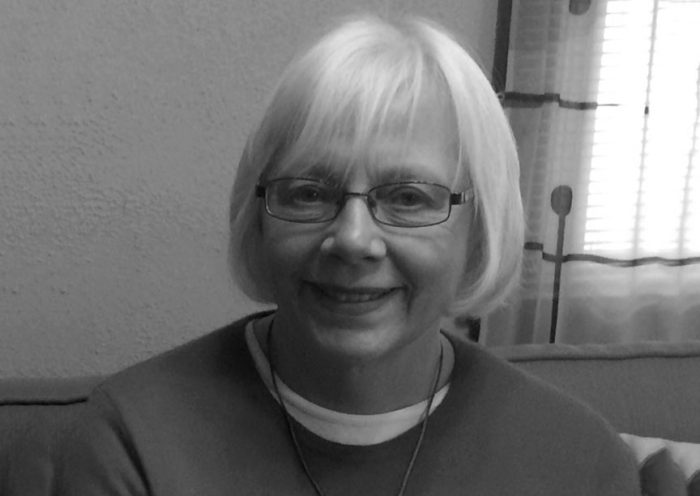The Blizzard of ‘47
by Anita G. Gorman
In 1947 few cars were parked on our street in Elmhurst, Queens. Those who had cars kept them hidden in garages behind their homes. Rarely did a neighbor drive a car to work; most took the bus on Queens Boulevard or the subway at the Grand Avenue station. An occasional car might travel up or down 55th Road, on its way to the excitement of Manhattan, perhaps, or in the opposite direction toward residential neighborhoods in the more hilly part of Elmhurst. In the summer I would ride my bike up and down the street, and when I was a teen I would venture as far as the World’s Fairgrounds in Flushing or the congested areas of Long Island City. But in 1947 I was only eight and not allowed to venture far from home. Our street and the nearby streets, filled with two-storey houses and narrow driveways, sidewalks and elm trees, would have to provide the entertainment I craved.
On summer days we kids would play potsie—the New York version of hopscotch—or I Declare War, a game that involved a ball and a large chalk circle drawn in the middle of the street and divided into countries we had heard of but never visited. And when winter came, we looked forward to sledding down 55th Road, which boasted a small hill at its top.
As Christmas approached, we hoped for snow, knowing full well that snow and Christmas went together, along with presents and Christmas cookies, and Christmas trees with ornaments and tinsel. In our house Christmas also meant my Swedish mother’s endless toil in the kitchen, making korv (sausage) and head cheese (pressylta) constructed from unknown parts of the pig, jellied veal (kalvsylta), and rice pudding (risgröt) with an almond hidden inside, promising to its lucky recipient good luck in the near future.
How excited we were as we imagined the presents we would receive on Christmas Eve and the second batch of presents on Christmas Day when my mother’s cousins, Ethel and Mabel, would arrive for dinner carrying a suitcase filled with delights for me and my little brother. How excited we were as we imagined the snow that just had to arrive in time for Santa Claus and his sleigh, and for the neighborhood kids and their sleds.
Yet in the midst of all the excitement and happiness, fear loomed, fear that we would be thwarted in our attempts to glide down our little hill on our American Flyers, thwarted by a lonely woman who lived in a basement apartment at the top of the hill. The apartment was part of a two-family house that fronted onto Van Horn Street, and the rear of the basement was exposed so Mrs. Hume did not have to walk down steps to get home. She was tall and thin and had white, curly hair. She lived by herself, and we had no idea what had happened to Mr. Hume. Did she ever have any children? She certainly did not like children. We did not seem to bother her too much in the summertime, since our games were held outside of my house on the more level part of the street. It was during wintertime that we played near her apartment, because she lived right by the little hill, and we needed that little hill. When it snowed, we would pull our sleds up the street to the top of the hill and begin our descent with a flying start at the summit, hoping our sleds would run fast, faster, as fast as possible. Our sledding enraged Mrs. Hume.
At first she would look out the window and peer into the street, scowling at our red and laughing faces. Then she would appear at her door and yell at us, telling us that this was her part of the street and we were not allowed there. I knew that Mrs. Hume did not own the street, that we had a right to go sledding and that she could not stop us. Ah, but she could, and she did.
Snow had already fallen that December in 1947, and we had played boisterously in spite of Mrs. Hume. Then about a week before our Christmas vacation was to start, snow started to fall again. I was in my fourth-grade classroom at Public School 102 at the top of our little hill. Our teacher was employing her usual method of dealing with my naughty classmates: she was yelling at the top of her lungs. That day the yelling didn’t bother me so much, since the snow was falling and once school was over we could take to the little hill and fly down 55th Road until our sleds stopped somewhere in the middle of the street when it became more level.
The snow kept falling, and I was so happy, happy that I would be able to hop on my sled that afternoon and fly down the hill. Finally the bell rang, the snow had stopped, and we were out the door. Our house was a minute from the school, and I was soon in the door, gulping my glass of milk and stuffing a cookie in my mouth. Then I put on my snow pants, my hooded jacket, and my boots. My mother opened the garage door for me, and soon I and my sled were walking up the street. Other kids, I knew, would soon be joining me.
Suddenly I stopped short. Something was wrong. A black line had appeared across the little hill on top of the newly fallen snow. I went up to it, wondering what it could be. I approached slowly. Then I saw what had happened: a path of ashes was now wending its way from one side of the street to the other. Where were the ashes from? They had to be from Mrs. Hume’s coal furnace. Who else would have sprinkled ashes across the street? She had to be the guilty person. Mean Mrs. Hume! There would be no sledding on the hill that day. I turned around and went home.
But that is not the end of my story. Christmas came, and so did my presents and Christmas cookies and the long-awaited visit from my mother’s cousins. Then Christmas dinner was over, and vacation days stretched out in front of us. We longed for more snow. We longed for so much snow that Mrs. Hume would not be able to put ashes on the road. The snow would fall and fall, and no matter how she tried she would not be able to prevent more lovely snowflakes from covering her awful ashes. I was going to get my wish.
The snow started falling on Christmas Day. It did not stop until the next day. I was jubilant. We—Mother Nature and I—had thwarted Mrs. Hume. She would never be able to compete with the Blizzard of ’47. By the time the snow ended, more than twenty-six inches had fallen, and drifts much higher appeared throughout New York City. Mrs. Hume could not leave her apartment to toss ashes on the street. There was one problem: we could not leave our houses either. There was too much snow. Mother Nature had thwarted all of us.
BIO

Anita G. Gorman grew up in Queens and now lives in northeast Ohio. Since 2014 she has had 71 short stories and 19 essays accepted for publication. Her one-act play, Astrid: or, My Swedish Mama, produced at Youngstown Ohio’s Hopewell Theatre in March 2018, starred Anita and her daughter Ingrid.














